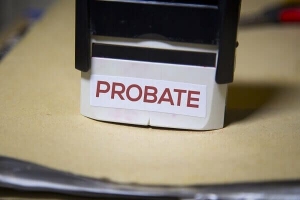
What Is Probate?
First and foremost, you need to know exactly what the term probate means in order to understand how your assets will be impacted by the process. Probate is an all-encompassing legal term that refers to the steps necessary to establish the validity of a will, ensure that it expresses the true wishes of the deceased party, pays for any outstanding taxes and debts, and properly distributes the remainder of the assets to the heirs according to any applicable state laws and regulations.
While there are some variances based on the jurisdiction in which the probate process is carried out, the general procedure typically unfolds like this: When an individual passes away, if they left behind a will, the party specified in the will as the “executor” or “personal representative” is required to file documentation with the local probate office. When an individual passes away and does not have a will, the judiciary will appoint a party to function as the executor of the given estate. Based on the size and characteristics of the estate, a specialized legal professional may be needed to assist with the executor’s duties in the administration of the estate.
After the court has ensured that the will is indeed valid, the executor is required to account for all of the assets that the decedent possessed. Understandably, this can be a significantly extensive and time-consuming process if the decedent did not leave behind detailed records pertaining to his or her various stocks, bonds, bank accounts, insurance plans and other property – which is yet another significant reason why responsibly engaging in the probate planning process during life can significantly benefit your loved ones after you pass away. Once all of the assets are specified, the executor will need to collect and safeguard them while the remainder of the probate steps are completed, which can take anywhere from a few months to over a year. The executor will also have to determine if there are any outstanding debts owed by the deceased party, identify the heirs, and contact any creditors.
All creditors will then have to be fully compensated from the funds of the deceased’s estate, and the remaining assets will be distributed to the named beneficiaries according to the directions contained in the will. Based on the will’s contents, the executor may have to choose whether or not to sell specific assets in order to accommodate for all creditors and beneficiaries. For example, if the will calls for several cash dispersals but the estate is comprised mainly of real property, then the property assets may have to be auctioned off in order to generate the needed cash.
Only after the court is satisfied that all creditors have been made whole, all beneficiaries and assets have been named, and all tax liabilities accounted for, will it give the executor permission to distribute the remainder of the estate to the individuals named in the will – or, in the case that there is no will, then to specific individuals based on intestacy statutes.
Probate vs. Non-Probate: Why Does the Distinction Matter?
As you can probably imagine, the probate process detailed above can be an expensive and lengthy process. Consequently, some individuals attempt to bypass probate by organizing their estate so that it is comprised solely of non-probate assets.
So what exactly is the difference between probate and non-probate assets? Probate assets are any possessions that are owned exclusively by the deceased individual. These assets can encompass the following categories:
- Real property that has a title bearing only the deceased individual’s name or that is held as a tenant in common
- Personal property, such as cars, fixtures, and jewelry
- Bank accounts that are held solely in the deceased individual’s name
- Interests in limited liability entities, partnerships, or companies
- Life insurance policies or brokerage holdings that lists either the deceased individual or his or her estate as the primary beneficiary
On the other hand, non-probate assets can include the following types of assets:
- Joint tenancy property or property that is held as tenants by the entirety
- Bank or brokerage accounts that the deceased held as a joint tenant or that are designated as payable on death (POD)
- Property that has been incorporated as part of a trust
- Life insurance or brokerage accounts that designate another individual, that is not the decedent, as the primary beneficiary
- Accounts traditionally considered retirement funds
Be Proactive in Your Estate Planning Process – Contact a Trusted Attorney Today
As you get your affairs in order regarding your estate, you need to account for both your probate and non-probate assets accordingly. Your will would be the controlling authority on the future distribution of non-probate assets. Be sure to double-check the ownership of your assets and accounts to ensure that any jointly owned property will be dispersed according to your wishes. You should also periodically review your named beneficiary selections and adjust them accordingly.
The Florida probate process can be complex and overwhelming for families and estate representatives as they attempt to sort out their deceased loved one’s affairs. The experienced probate attorney of Beller Law, P.L., understand the inherent challenges of this process and can assist you in navigating the probate process. Our attorney have a thorough understanding of each and every nuance of Florida probate law and will draw form over a decade of experience in assisting clients like you in order to help you attain a viable solution to even the most complex and challenging estate planning cases. Contact Beller Law, P.L., by calling us today to speak with our helpful legal team about what your legal options are. We work directly with you to assist you in this trying time and ensure that your case receives the attention it deserves.
